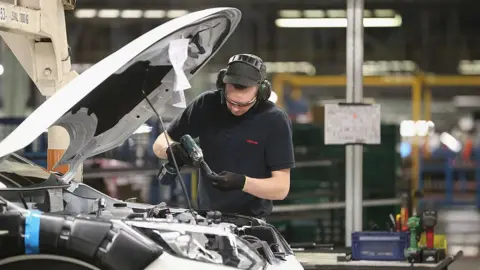UK manufacturing growth 'accelerates'
 Getty Images
Getty ImagesGrowth in the UK's manufacturing sector accelerated last month, according to a closely watched survey, with output, orders and employment all picking up.
The Markit/CIPS purchasing managers' index (PMI) for manufacturing rose to 56.9 in August from 55.3 in July. A figure above 50 indicates expansion.
The PMI reading was the second highest for more than three years.
Rob Dobson from Markit said the sector continued to show signs of "solid progress".
He said it was increasingly likely that growth in the sector would be maintained "given the breadth of the expansion", with both big and small companies seeing conditions improve.
"The survey data suggest that the manufacturing economy remains in good health despite Brexit uncertainty, and should help support on-going growth in the economy in the third quarter, which will add fuel to hawkish policymakers' calls for higher interest rates."
On Thursday, Michael Saunders, a member of the Bank of England's interest rate-setting Monetary Policy Committee (MPC), said "a modest rise" in interest rates was needed to curb high inflation.
Mr Saunders has voted in favour of raising rates at the past two meetings of the MPC.
Job boost
The PMI survey found that production increased at the fastest pace for seven months in August, helped by a pick-up in new orders.
The main source of new orders was the domestic market, although orders from abroad "remained robust".
The recent weakness of the pound has helped to push up demand for UK goods from overseas, although it has also raised the cost of imports. Nearly a third of companies said the prices of goods they bought had risen, which was mainly due to rising commodity costs.
The rate of job creation in the manufacturing sector rose at the fastest pace for 13 months, the report said.
Samuel Tombs, chief UK economist at Pantheon Macroeconomics, said: "The pick up in the PMI brings tentative hope that the recent decline in the official manufacturing output data will be reversed swiftly.
"The manufacturing sector, however, should be doing even better, given sterling's huge depreciation and the emergence of a strong recovery in the eurozone."
